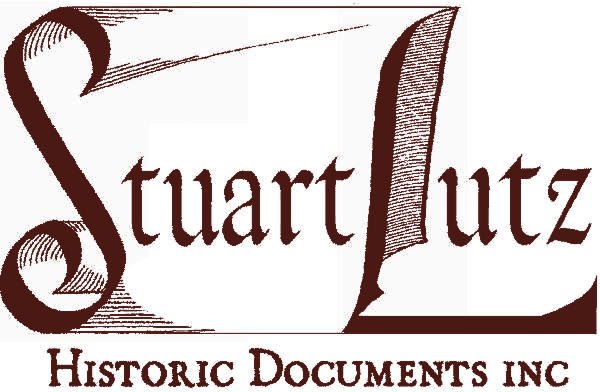| |
 NANCY ASTOR NANCY ASTOR |
|
|
|
|
| |
Price: $350.00 |
Stock# 4668 |
| |
LADY ASTOR, SHORTLY AFTER BEING ELECTED TO PARLIAMENT FOR THE FIRST TIME, WRITES “THOUGH I GREATLY APPRECIATE THE PRIVILEGE OF BEING THE FIRST WOMAN TO ENTER PARLIAMENT IN ENGLAND, IT HAS CERTAINLY ENTAILED MANY SACRIFICES, THE GREATEST OF WHICH IS HAVING TO BE AWAY SO MUCH FROM MY CHILDREN!”
NANCY ASTOR (1879-1964). Astor was the first woman to sit in the British Parliament. She was elected to the House of Commons in December 1919. She served in Parliament for over a quarter century and was known for her wit and her feud with Winston Churchill.
TLS. 1pg. 8” x 10 ½”. July 27, 1920. London. A typed letter signed “Nancy Astor” with a postscript “How well I remember those day at dear Grandma Agassiz”. She wrote to Mrs. Cornelius Felton on Boston: “It was indeed kind of you to write to me on May 23td, and I deeply appreciate your letter. It is such letters as yours that comfort and encourage me in what are often very difficult days. Though I greatly appreciate the privilege of being the first woman to enter Parliament in England, it has certainly entailed many sacrifices, the greatest of which is having to be away so much from my children!” The letter has mailing folds and the original envelope is included. |
4668
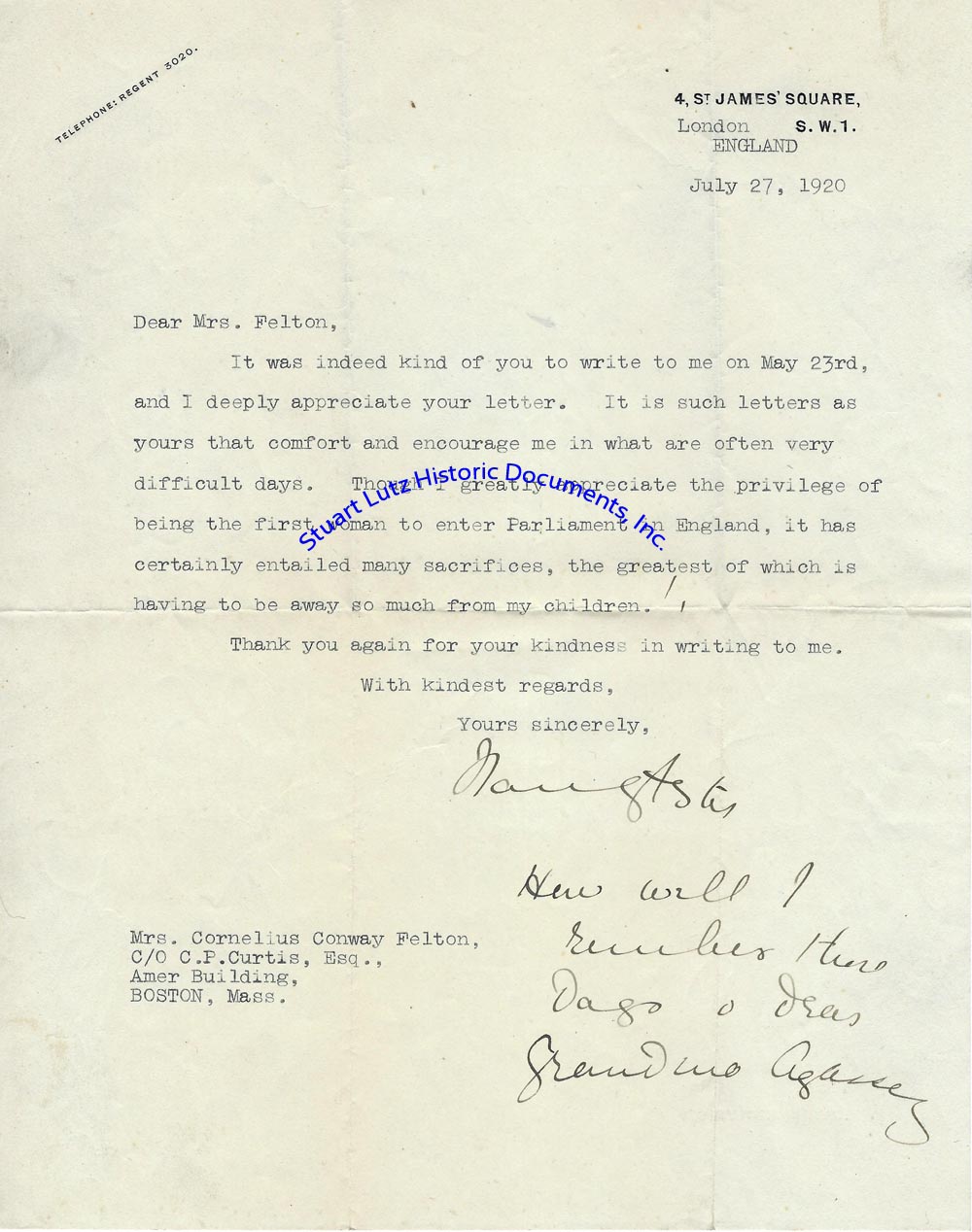
|
|
| |
| |
 FRANCIS BARING FRANCIS BARING |
|
|
|
|
| |
Price: $600.00 |
Stock# 5433 |
| |
BRITISH BANKER SIR FRANCIS BARING WRITES TO FRENCH COLLEAGUE JACQUES RECAMIER
SIR FRANCIS BARING (1740-1810). Baring was an English banker and baronet.
LS. 1pg. October 21, 1802. London. A letter signed “F Baring”. Baring wrote in French to Parisian banker Jacques Récamier (1751-1830), husband of the more famous Juliette Récamier, regarding a substantial payment to French diplomat Louis-André Pichon (1771-1854). In translation, it reads in part: “I have received today a letter from the United States dated September 9. Our friends there receive an order that my house sent them, paying one million livre tournois to Mr. Pichon. They add that the money is ready, except for Mr. Pichon is then at the Washington government residents, and that he was waiting two days. … I [am] happy, Sir, to take this occasion to offer you my sincere thanks for all the attentions and marks of friendship that I feel for your Lady, you and your son during my stay in Paris…F Baring”. The international business requiring this large transaction, about which Baring requests Récamier’s silence, is unclear. It is in fine condition. |
5433
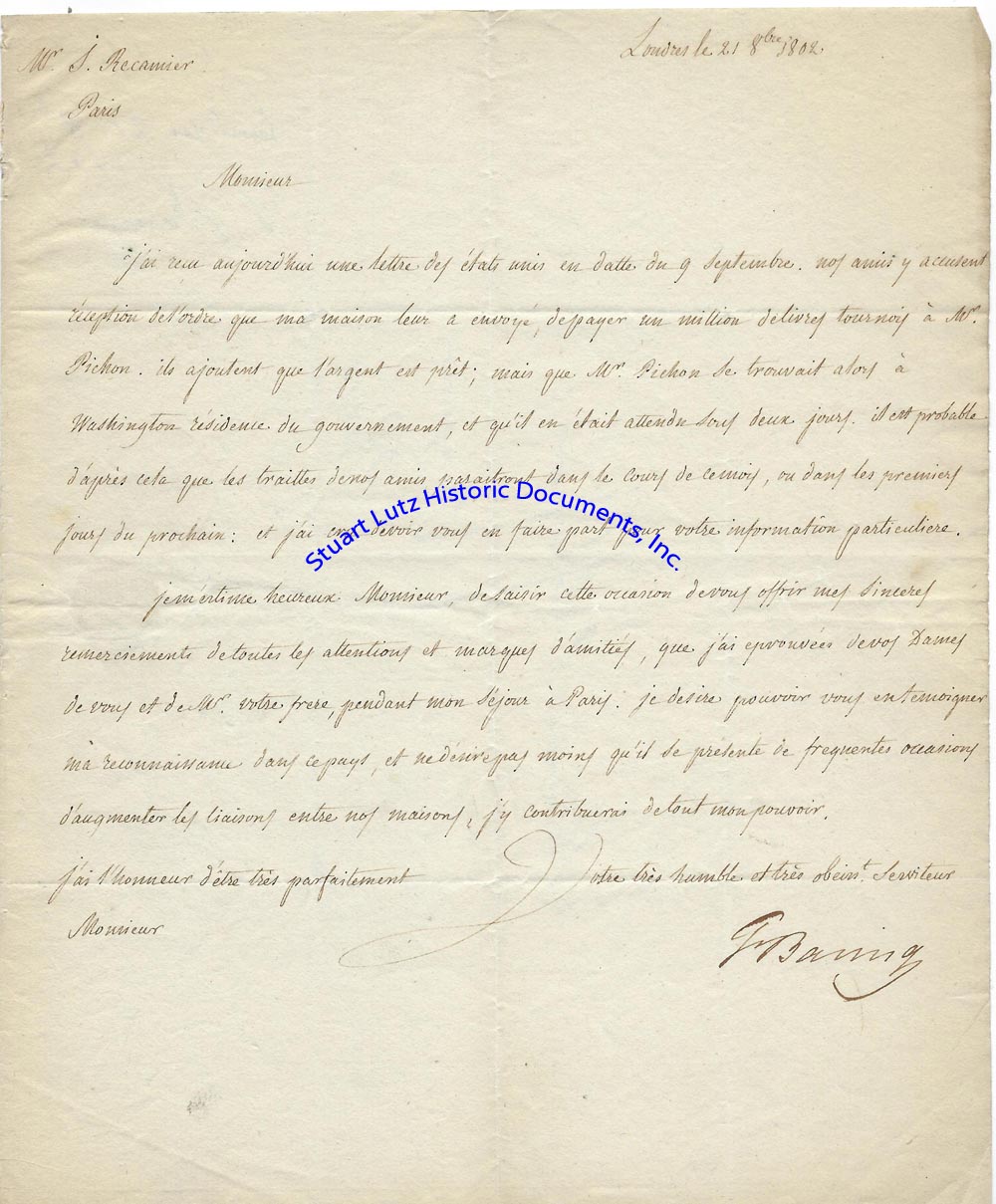
|
|
| |
| |
 ROBERT BROWNING ROBERT BROWNING |
|
|
|
|
| |
Price: $750.00 |
Stock# 6328 |
| |
ROBERT BROWNING ACCEPTS AN INVITATION FROM A NOBLE WOMAN
ROBERT BROWNING (1812-1889). Browning was among the best known and most esteemed English poets of the nineteenth century.
ALS. 1pg. 4 ½” x 6 ½”. April 27, 1877. 19 Warwick Crescent [London]. An autograph letter signed “Robert Browning” to Lady Hatherley. The author penned: “Dear Lady Hatherley, I beg to thank you for your kind invitation & to say that I accept it with great pleasure. With best respects to Lord Hatherley pray believe me Dear Lady Hatherley Yours very truly Robert Browning”. It is matted with a portrait of the poet and framed to an overall size of 15” x 11 ½”. |
6328
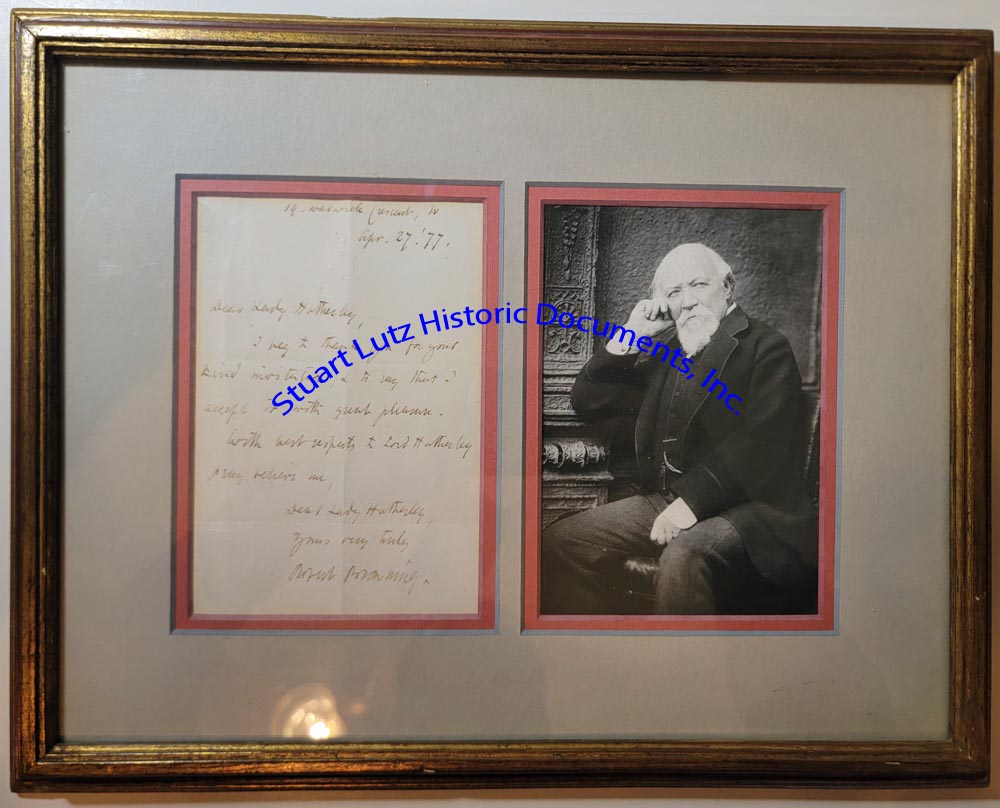
|
|
| |
| |
 EDMUND BURKE EDMUND BURKE |
|
|
|
|
| |
Price: $2,500.00 |
Stock# 5286 |
| |
PARLIAMENTARIAN EDMUND BURKE WRITES TO HIS BANKER
EDMUND BURKE (1729-1797). Burke was an Irish politician, philosopher, and longtime British parliamentarian.
ALS. 1pg. May 1, 1796. Baconsfield, England. An autograph letter signed “Edm. Burke”. Burke wrote to banker Stephen Thurston Adey. “My Dear Adey, I suppose you have already had a Bill drawn on your home from Wm. Smettel at Bath for twenty five pounds on my account. I beg you to honour it. I am ever my d. friend Very truly yours Edm Burke”. The letter is in very good condition, with creasing, mild discoloration, and small tears throughout. Burke is a scarce autograph. |
5286
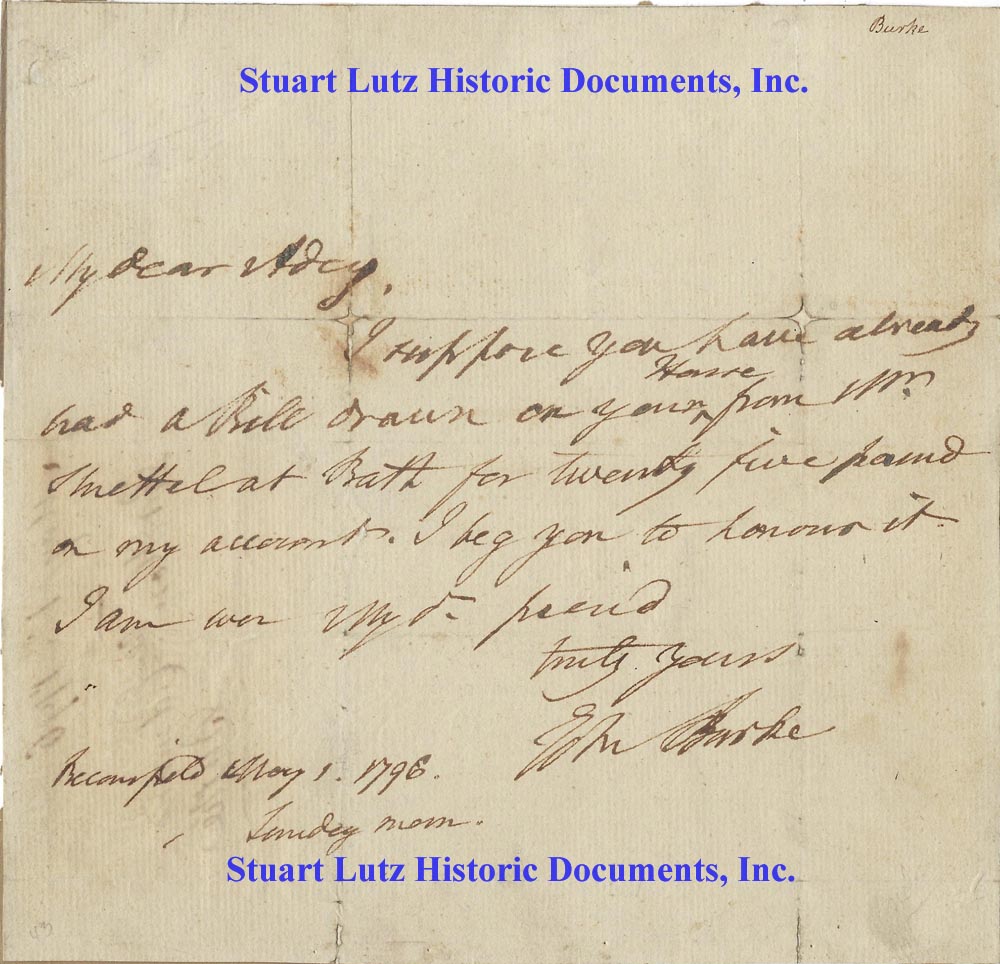
|
|
| |
| |
 JOHN CAMPBELL JOHN CAMPBELL |
|
|
|
|
| |
Price: $350.00 |
Stock# 5988 |
| |
BRITISH REAR ADMIRAL JOHN CAMPBELL WRITES SHORTLY AFTER END OF AMERICAN REVOLUTION ON CONTINUED NAVAL TENSION BETWEEN AMERICA AND GREAT BRITAIN: “REQUEST THAT YOUR LORDSHIP WILL BE PLEASED TO FURNISH ME WITH INSTRUCTIONS HOW TO ACT IN THIS AFFAIR”
JOHN CAMPBELL (1720-1790). Campbell was a British naval officer rising to the rank of Rear Admiral, navigational expert, and colonial governor of Newfoundland.
LS. 2 pg. 7” x 10”. July 28, 1783. Leicester fields. A letter signed “Jn: Campbell” to “Right Honble Lord North”: “My Lord Having been informed by Mr. William Newman a Principal Merchant trading to Newfoundland that an American vessel arrived at St. John’s from Boston in May last, laden with Rice and Flour And that the Customhouse had refused to admit her to an Entry and come to a resolution of detaining her until the Governor’s arrival; I think it my Duty to communicate to your Lordship this information and to request that your Lordship will be pleased to furnish me with Instructions how to Act in this Affair”. This letter from John Campbell, the Governor of Newfoundland, to Frederick North, British Home Secretary, reflects the continued distrust and disagreement between Britain and the United States as the American Revolution came to a formal resolution. Lord North served as British Prime Minister through the Battle of Yorktown, which brought down his government. In his subsequent role as Home Secretary, North was tasked with helping to complete what would become the Treaty of Paris. Though the treaty would grant shared access to the Mississippi River and American fishing rights near Newfoundland, continued British military presence near the Great Lakes and harassment of American commercial vessels in the Atlantic perpetuated tension between Great Britain and the United States for the next few decades. This tension resulted in the polarizing Jay Treaty and Embargo Act and culminated in the War of 1812. The letter is in fine condition with the first page of the letter being toned. |
5988
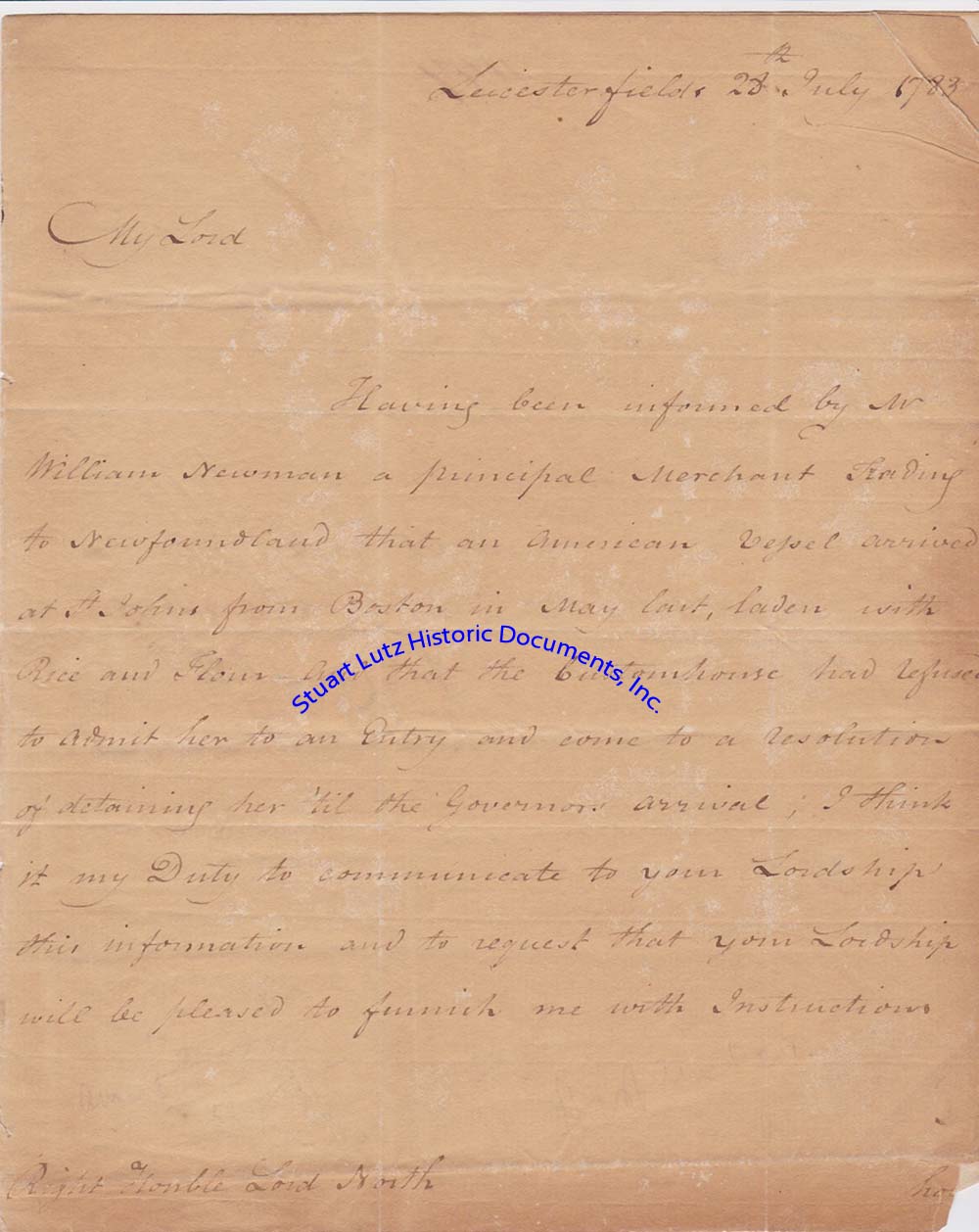
|
|
| |
| |
 ALBERT CAMUS ALBERT CAMUS |
|
|
|
|
| |
Price: $3,000.00 |
Stock# 5383 |
| |
A TYPEWRITTEN DRAFT PAGE WITH AUTOGRAPH CORRECTIONS FROM ALBERT CAMUS’S FAMOUS THE CRISIS OF MAN SPEECH GIVEN AT COLUMBIA UNIVERSITY IN 1946
ALBERT CAMUS (1913-1960). Camus was a Nobel Prize-winning French author best known for his absurdism and works like The Stranger and The Plague.
TM. 1pgs. N.d. [1946]. N.p. One page of a typed draft of Albert Camus’s famous “The Crisis of Man” (or “The Human Crisis”) speech, with autograph corrections. Camus delivered this landmark speech at Columbia University on March 28, 1946, during his only trip to the United States. Asked to talk about the French sensibility, Camus delivered a compelling meditation about the Second World War and the crisis facing all humanity. The tone is both stirring and thought-provoking. Camus had been a resistance fighter during the war, and his experiences obviously color his speech, particularly in his descriptions of atrocities committed during the war. In 2016, Columbia held an event to commemorate the 70th anniversary of Camus’s speech. There, actor Viggo Mortensen read Camus’s speech to a sold-out crowd in the Miller Theatre – the same venue where Camus had spoken. Even three-quarters of a century after its debut, “The Crisis of Man” remains relevant and timely, and people continue to reflect on it today. The draft, which is the second page of the speech, is written in French and has several dozen handwritten words in Camus’s diminutive handwriting. The English translation of the typewritten portion is as follows: “… Mr. Smith, Mr. Durand, Herr Vogel, but no commonality among these three particular phenomena. The moral attitude of this generation was even more categorical: nationalism seemed to it an outmoded truth and religion an escape. 25 years of international politics have taught this generation to be skeptical of any notion of purity and to think that nobody was ever right or wrong. As for the traditional morality of our society, it seemed to us that it hadn’t ceased being what it had always been, namely a monstruous hypocrisy. So we lived in negation. Of course, that was nothing new. Other generations and other countries in other historical periods experienced this. But what is new is that these same men, strangers to any kind of values, had to adapt their personal position in regard to murder and terror. That is when they knew they had to acknowledge that there might be a Human Crisis, as they had to live a most wrenching contradiction. They had, after all, entered war the way one enters Hell, if it is true that Hell is the ultimate denial. They loved neither war nor violence, yet they had to accept war and practice violence. The only thing they hated was Hate itself. Yet they had to acquire this difficult skill. In plain contradiction with themselves, without having any traditional values at their disposal, they had to deal with the most grievous problem which…ever…So here is on the one side a singular generation…and on the other side a crisis…which has the dimension of the world and of human conscience and which I would now like to characterize as clearly as possible”. It is written on onion skin paper and is in very good condition, with some minor toning. |
5383
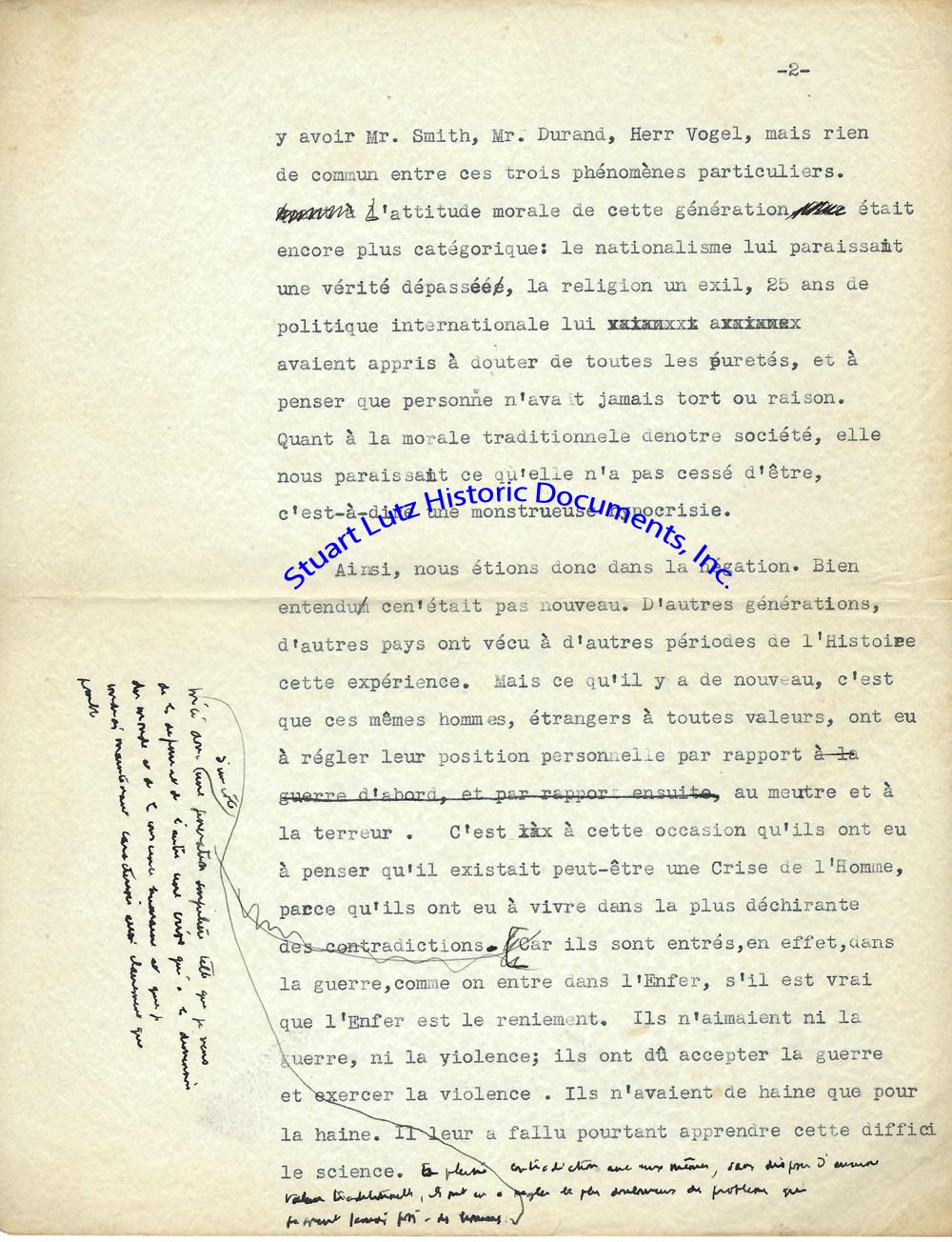
|
|
| |
| |
<Previous 6> <Next 6>
|
 |
